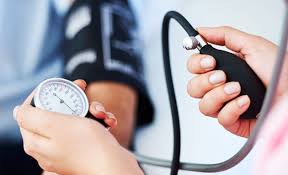High Blood Pressure: 9 Simple and Proven Ways to Lower It Naturally at Home and Protect Your Heart
High blood pressure, or hypertension, is a silent health risk that can damage your heart, kidneys, and overall well-being if left unmanaged. The good news is that lifestyle changes can bring your blood pressure down without depending solely on medication. Here are nine proven, science-backed methods to reduce hypertension naturally at home and improve heart health.


By: Bharat Daily Samachar Date: 1 October,2025
High blood pressure, medically known as hypertension, affects millions of people worldwide. Often called the “silent killer,” it usually shows no obvious symptoms but significantly raises the risk of heart disease, stroke, and kidney problems. If left uncontrolled, high blood pressure can slowly damage your arteries and put extra strain on your heart.
While medication prescribed by doctors plays a crucial role in managing hypertension, many people can lower their blood pressure naturally by making simple lifestyle changes. Here are nine proven ways to reduce blood pressure at home—backed by science and easy to adopt.
1. Cut Down on Salt Intake
Excess salt (sodium) is one of the biggest triggers of high blood pressure. Sodium makes your body hold on to water, which raises blood volume and puts pressure on artery walls. Reducing salt can have an almost immediate impact on blood pressure.
Avoid processed foods, packaged snacks, instant noodles, and pickles.
Replace salt-heavy meals with herbs, lemon juice, garlic, and spices for flavor.
Aim for less than 1 teaspoon of salt per day (including hidden salt in food).
2. Eat More Potassium-Rich Foods
Potassium helps balance sodium levels in the body by relaxing blood vessels and reducing fluid retention. A diet rich in potassium has been shown to lower hypertension naturally.
Great sources include:
Bananas, oranges, and avocados
Leafy greens like spinach and kale
Sweet potatoes and beans
Adding these to your daily meals can support a healthier heart.
3. Maintain a Healthy Weight
Being overweight or obese puts extra strain on your cardiovascular system. Research shows that even losing 5–10% of your body weight can significantly reduce blood pressure levels.
Track your BMI (Body Mass Index).
Focus on gradual, sustainable weight loss through balanced diet and physical activity.
Avoid crash diets and instead build long-term healthy eating habits.
4. Get Moving with Regular Exercise
Physical activity strengthens the heart and improves blood circulation, helping arteries remain flexible. Just 30 minutes of moderate exercise most days of the week can lower blood pressure naturally.
Some effective activities include:
Brisk walking or jogging
Cycling or swimming
Yoga and aerobic workouts
The key is consistency—make exercise part of your routine rather than a temporary effort.
5. Reduce Stress Levels
Stress triggers the release of hormones like cortisol and adrenaline, which temporarily raise blood pressure. Chronic stress can make hypertension worse over time.
To manage stress:
Try deep breathing or meditation for 10 minutes daily.
Listen to calming music or practice yoga.
Prioritize sleep and relaxation, avoiding overwork.
Managing stress not only helps blood pressure but also improves overall well-being.
6. Limit Alcohol and Caffeine
While moderate drinking may not harm everyone, excessive alcohol consumption raises blood pressure and damages the liver. Similarly, caffeine can temporarily increase blood pressure in sensitive individuals.
Limit alcohol to no more than 1 drink per day for women and 2 for men.
Monitor how coffee and tea affect your body—switch to green tea or herbal teas if necessary.
Moderation is key when it comes to alcohol and caffeine.
7. Eat a Heart-Healthy Diet
The DASH diet (Dietary Approaches to Stop Hypertension) is recommended globally for managing high blood pressure. It emphasizes:
Fruits, vegetables, and whole grains
Lean proteins like fish, chicken, and beans
Low-fat dairy, nuts, and seeds
Minimal red meat, fried foods, and sugary drinks
This diet is not just for people with hypertension—it benefits anyone aiming for better heart health.
8. Quit Smoking Immediately
Every puff of a cigarette raises blood pressure temporarily and damages arteries. Long-term smoking accelerates the risk of heart attacks and strokes.
Quitting smoking improves circulation and lowers the risk of hypertension complications. The body starts healing almost immediately after quitting:
Within 20 minutes, heart rate drops.
Within 2–3 months, lung function improves.
Within a year, heart disease risk decreases significantly.
9. Monitor Blood Pressure at Home
Self-monitoring helps you stay aware of your blood pressure trends. Home monitors are widely available and easy to use. Keeping track:
Helps identify patterns and triggers.
Motivates lifestyle changes.
Allows you to share accurate readings with your doctor.
Pair this habit with regular medical checkups for the best results.
Key Takeaways
High blood pressure does not improve overnight, but small, consistent lifestyle changes can make a big difference. Remember:
Eat less salt and more potassium-rich foods.
Stay active and maintain a healthy weight.
Manage stress, avoid smoking, and limit alcohol.
Follow a heart-friendly diet and track your numbers regularly.
Final Thoughts
Hypertension may be common, but it is not unbeatable. By making smart choices in your diet, exercise, and daily habits, you can lower your blood pressure naturally at home and protect your heart from long-term damage.
Even if you are on medication, these nine lifestyle strategies will boost the effectiveness of treatment and improve overall health. Start today—your heart will thank you for it.
